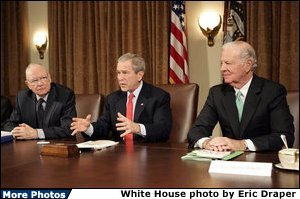U.S. Public Opinion in Line with Iraq Group's Proposals

A new poll by WorldPublicOpinion.org finds that three out of four Americans believe that in order to stabilize Iraq the United States should enter into talks with Iran and Syria, and eight in 10 support an international conference on Iraq. A majority also opposes keeping U.S. forces in Iraq indefinitely and instead supports committing to a timetable for their withdrawal within two years or less.
The poll shows that the attitudes of the U.S. public are consistent with several key proposals endorsed by the Iraq Study Group.
The poll of 1,326 Americans, conducted Nov. 21 to 29, was developed in conjunction with the conference, "Leveraging U.S. Strength in an Uncertain World," to be held by the Stanley Foundation Dec. 7 at the Ronald Reagan Building, Washington, D.C. Results of the full survey, which covers a wide range of international security issues, will be released at the conference on Thursday.
Steven Kull, editor of WorldPublicOpinion.org, said that the findings show broad public support for the proposals expected from the Iraq Study Group.
Headed by former GOP secretary of state James Baker and former Democratic congressman Lee Hamilton, the study group has evaluated US involvement in Iraq and today delivered a report on its findings to the White House and Congress.
"There is potential for finding some bipartisan consensus on the next steps for the U.S. to take in Iraq," Kull says.
WorldPublicOpinion.org told respondents that there is "a debate about whether to work with Iraq's neighbors with whom we have other disputes." Nonetheless, 75 percent say that the United States should have talks with Iran and the exact same number say that the United States should have talks with Syria. This diplomatic approach is endorsed overwhelmingly by people in both parties: Eight in 10 Democrats and seven in 10 Republicans endorse talking with both Iran and Syria.
On the issue of how long U.S. troops should remain in Iraq, a majority of Americans reject the current policy of keeping troops in the country indefinitely. Fifty-eight percent say troops should be withdrawn according to a timetable, while 38 percent say that U.S.-led forces should only be reduced "as the security situation improves." There is substantial variation in the length of the timetable preferred: 18 percent prefer six months, 25 percent one year and 15 percent two years.


0 Comments:
Post a Comment
Subscribe to Post Comments [Atom]
<< Home